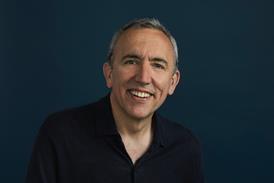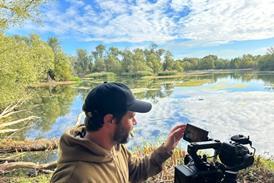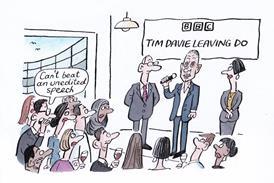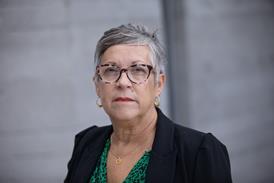The story of a homeless, self-harming heroin addict who has suffered repeated sexual abuse seems a particularly bleak subject for a first TV project.
Neal Street Productions fought hard to land rights to the critically acclaimed memoir from first-time author Alexander Masters, feeling it was a story that had to be told.
'It is very dark in places and punctuated by extreme violence,' says producer Pippa Harris. 'But there are humorous moments and a central relationship of great warmth, so the cumulative effect is very powerful.'
Stuart Shorter is a homeless alcoholic with a violent past who strikes up an unlikely friendship with charity worker Masters. As Alexander learns more about Stuart's complicated life and traumatic childhood, he asks if he can write his story and Stuart advises him to tell the story backwards so it's 'more exciting - like a Tom Clancy murder mystery'.
Story pursuit
'We weren't interested in pursuing a story about homelessness. There are many films which have done that,' explains Harris. 'We felt very strongly that Stuart lived an exceptional life, more interesting than many celebrities or politicians who usually receive biopics. We wanted to redress that balance.'
BBC drama controller Jane Tranter felt the same way and handed creative development on the project to BBC Wales drama chief Julie Gardner.
Despite the fact that Masters was unfamiliar with even basic screenplay conventions such as centring the dialogue on a page and numbering scenes, Harris says Gardner trusted Neal Street's instinct that Masters would deliver a polished script. 'After the first draft we made some suggestions and he wrote a very accomplished piece,' says Harris.
Neal Street's focus has been on theatrical features such as Starter for Tenand the forthcoming Revolutionary Roadstarring Leonardo DiCaprio and directed by company co-founder Sam Mendes, but when Masters' literary agent approached them, Harris and co-executive producer Tara Cook 'fell in love' with the material.
'Stuart is a small-scale story essentially about the friendship between two mismatched individuals which is very harrowing to watch at times,' says Harris, referring to scenes of sexual abuse and threatened rape. 'That would have been hard to sell into a multiplex but it's exceptionally well suited to TV.'
Matching intentions
Masters made a point of interviewing all those interested in a screen adaptation but may have chosen Neal Street, Harris believes, because its intentions matched his - 'to preserve the anarchic character of the book'.
This included the decision to replicate Masters' pen and ink illustrations as mini-animations within the live action as a device to reveal the author's inner thoughts. 'We needed to get the animation to emerge from the live action and merge back into the drama so we had to be able to provide the animators with fairly detailed shots to work with early on,' said Harris.
Masters worked with design company Knifedge to create 10 animated vignettes. For director David Attwood ( To the Ends of the Earth), the animations and multiple flashbacks and flash forwards were part of the process of creating an unconventional film that tasked the audience with solving the puzzle of Stuart's life.
'The animations were a visual shorthand for depicting some of the drama in his life without having to laboriously shoot it, as well as enhancing the buddy nature of his relationship with Alexander,' he says. 'What interested me was trying to answer the question of what made him who he was and along the way you come up with lots of different answers.'
The 90-minute piece was shot in August 2006 over six weeks on location in London and Cambridge with Benedict Cumberbatch ( Starter for Ten) as Masters and Tom Hardy ( Black Hawk Down) as Stuart.
Doing time
The actors spent time with homeless groups in Cambridge, with Masters himself and Shorter's family. Since Stuart died in 2002 (before the book was published), Hardy relied on friends' recollections of his character as well as a short BBC2 documentary Private Investigation(1999) about the homeless which Stuart had presented.
Shorter had the degenerative disease muscular dystrophy, so Hardy's performance sought to capture his stiffness of movement and peculiar wheezing voice. Cumberbatch, Attwood feels, arguably had the harder role since there were fewer obvious character traits to build on.
'If you engage with the actors you engage with the film,' he says. 'We intentionally shot fairly wide and standing back from the characters with few TV-style close-ups so as not to push the audience toward one answer or another.'
Some of the scenes, particularly those featuring self-harm, were so intense that Attwood shot with two 16mm cameras so Hardy wouldn't have to rehearse multiple takes.
Plenty of freedom
Says Attwood: 'I sometimes didn't tell the actors where the cameras were pointing to give them as much freedom as possible. We improvised for longer than usual to bring out their relationship.'
According to Pepper colourist Chris Beeton, the production called for him to create a faded '1970s feel' from the original, slightly overexposed rushes. 'The natural instinct is to push the contrasts but this time we were giving it a very light, almost bleached, look,' Beeton says. 'It was counter-intuitive but a refreshing challenge.'
Attwood stresses that this is not a campaigning piece. 'Nor does it examine the 'shocking underbelly of life in the UK'.' He adds: 'The worse epithet you could level at it is that it's 'gritty'.
'The book's tone is not patronising or worthy but sunny and acerbic and that's the tone we needed. It's a detailed look at someone's life that asks how honest can we be with ourselves.'
TX:Stuart: A Life Backwards
Broadcaster:BBC2
Producer:Neal Street Productions for BBC2/HBO Films
Start: 9pm, 23 September
Director:David Attwood
Producer:Pippa Harris
Executive producer: Sam Mendes, Tara Cook
Executive producer, BBC:Julie Gardner
Screenplay: Alexander Masters, based on his book
DoP:Ulf Brantas


























No comments yet